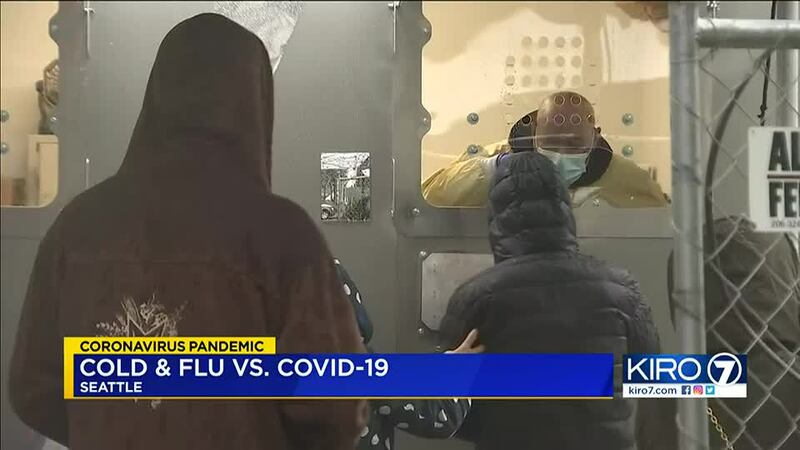The rainy season is here – and along with it, cold and flu season. Confusion between the symptoms has people flocking to COVID test sites. UW Medicine’s virology lab shows just within their system, more than 11,600 people got tested on Wednesday, nearly reaching volumes last seen before Christmas, which peaked at about 13,200.
“A little runny nose, some congestion, a little scratchy throat,” said Steph Giola, who said she suddenly felt these symptoms come on after being rid of such inconveniences since 2019. “I feel like the ambiguity around these generic symptoms has gotten even a little more scary, so to speak, because of COVID,” she said.
She got a COVID test at the UW Medicine-run Seattle test site in Ballard on Thursday, where people lined up down the sidewalk in the morning, despite the rain.
The cold medicine sections at multiple pharmacies in Seattle were also looking bare on Thursday.
“There is always something going around especially this time of year. This is why we call it cold and flu season,” said Dr. Paul Pottinger with UW Medicine’s Allergy and Infectious Diseases department. “Why? Because people are spending more time indoors. Kids are going back to school,” he said.
Pottinger says it’s impossible to tell whether you have a common cold, the flu, or COVID-19 from symptoms alone.
“There is a huge spectrum (of symptoms). Some people – in fact, most – will have a pretty mild illness, but they are still a threat to other people,” Pottinger said.
That’s why he says it’s important to get tested whenever you show signs of any respiratory illness, even if you are vaccinated.
Could be a sore throat, runny nose, pervasions of taste and smell, fever, muscle aches, fatigue. Anything along those lines – very severe or even mild – I want that person to get tested,” Pottinger said. For example, he said someone who is vaccinated with a mild sore throat should still get tested.
Pottinger says even though this wave of new cases appears to be slowing down, hospitals are still on the verge of being overwhelmed. That’s why he says knowing what you have this cold and flu season is critical.
“The only thing worse than COVID is hurting someone else with your COVID. Let’s stop that cycle. Get everyone immunized, get tested if you’re sick, and break the cycle,” Pottinger said.
A few other points Pottinger noted:
- COVID can present without a fever.
- A lab test result will never confuse influenza with the COVID virus.
- You can get the COVID booster shot or a regular cycle COVID vaccine shot at the same time as a flu shot.
- Anyone who was in an unmasked situation within six feet for 15 minutes or longer with someone who tests positive for COVID should immediately get a COVID test, quarantine for a few days, then get tested again – even if you are vaccinated.
©2021 Cox Media Group








